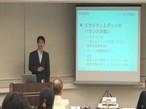Vision: Say it in Swahili
Hello. This is Irino, a strategy consultant.
I am going to explain about vision; mission statement, credo, corporate identities.
Table of Contents in Business Plan
|
Mission statement written only by CEO doesn’t lead employees to put it intopractice. It’s better to involve your staff in writing process for more commitment. The process is more important than the final statement itself.
Mission statement written in your native language sounds good, just because you are fluent in the particluar language. Translate your mission statement to aother language. Translate it back to your native language. If a lot of meanings are lost in translation, it means your mission statement were weak in the first place, or your vision is not global enough.
There are 6,000,000 companies in Japan. Among them, 50,000 companies are over 100 year old. That’s surprisingly many, isn’t it? Their business models change along with enrironments. But their mission statement often survive for 100 years.
Startup companies need talents, but cannot afford. The more talented, the more competitive salary they already have. But the more talented, the less likely they are moved by money. They are moved by opportunities to make a difference to society. Your mission statement should be worth half the salary of a six-figure talent.
Employees read credos only when joining the company. Credo is useless if it’s not put into practice everyday. Some companies force team staff to read aloud credos in morning meetings. It’s a old-fashioned style that startups tend to dislike, but it’s quite effective.
Some people say “I’ll do this businesss for starving kids in Africa”. But it’s too far to be passionate about somebody you’ve never met. It’s more realistic to say “I’ll do this business for that guy”. The closer, the more passionate.
Some people write too goody-goody mission statement like Non Profit Organization. The bottom line is that if you don’t make money, you’ll make trouble to those who support your mission.
Products speak a lot louder than words in business plan. Customers are not interested in your talk. Create products that represents what you believe.
Some people try to create mission statement too different from any other company. But it’s easier to find supporters and find M&A exit buyers if you have similar mission statement in common.
If money is all that matters, business relationship is just power game. It’s not advantageous for startups.
When things are going well, people don’t do something dishonest. Fraud tend to happen in adversity;
- When you are in the red
- When you are short of cash
- When fraud was already made by predecessors
National Tax Agency officials are rude to small companies. It doesn’t mean that you may cheat on taxes. Natinal Insurance Angency lost records of 50,000,000 people. It doesn’t mean that you may cheat on pension. Big companies make money from shabby software. It doesn’t mean that you may copy software illegally. Don’t compromise your integrity just because you’re a SME.
Success rate of startups is lower than you think. Nobody can gurantee good result.Try something you can enjoy the process of. Nobody is sure about the result. Many entrepreneurs get bankrupt. Many entrepreneurs get divorced. Many entrepreneurs get betrayed. Choose mission statement still worth trying.
When you start a business, there will be times when things are rough more or less. The key is whether you can remember your management principles during hard times and get back on your feet and strive again.
Some people show love and support to startups. But they are less than 1 % of people around you. 50% people is indifferent to your project. 49% people gives you negative comments. Don’t fight with 99% of bystanders. Startups don’t have that kind of time.
Many of independent-minded entrepreneurs don’t explain about their businesse to their family. But family support is important. Some venture capitals interview entrepreneur’s wife in due deligence.
Few entrepreneurs are born to enter the profession. To be honest, most entrepreneurs start business to make a living. Still, they make efforts on what they have to do. Their mission levels up gradually from “to make a living”, to “to make employees happy”, to “to change the world for the better”. The opposite case is rare and precious, but it seems a bit phony.

A successful startup founder sighed about the gap between founders and non-founders. There’s a difference in ability, achievement and awareness. When a small startup becomes bigger, non-founders start to worship founders, and stop thinking for themselves. Non-founders don’t argue back to founders. But founders want counterargumet and new ideas desparately.
That’s it for today.
- One-two finish in the largest business plan contest in Japan
- One-two finish in Asian Entrepreneurship Award
- No.1 in google "business plan"
- Judge in the Cloud-Computing Awards
- Write/Review +100 business plans a year
- Meet +300 entrepreneurs a year
- Large-scale project management
e.g. +15,000 man-months post merger integration - Expertise: business planning, financing, IT, project management
- Fortune Global 500 companies:
bank, brokerage, card, SIer, etc - Startups:
IT, cloud, bio, cosmetics, minor metals, aerospace, etc - Tokyo University -> University of British Columbia -> Oracle -> Headstrong -> Independent



